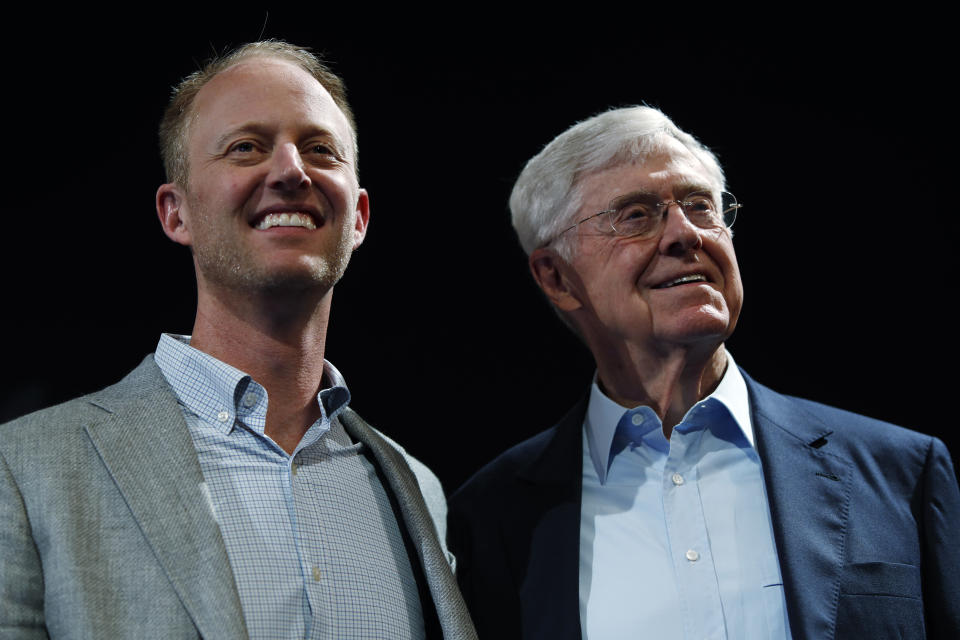How the estate tax affects where Americans live
This post was originally published on Yahoo Finance.
Many people would assume that billionaires could live wherever they want to, but a new study published by the National Bureau of Economic Research finds that the extremely rich are, in fact, extremely sensitive to local tax changes.
Before 2001, there was a federal tax credit that fully offset state-specific estate taxes. But after the tax cuts passed by President George W. Bush, the credit was phased out and how much a person’s estate is taxed upon death became highly dependent on where their primary residence was.
Researchers Enrico Moretti of UC Berkeley and Daniel J. Wilson of the Federal Reserve Bank of San Francisco found that the “the number of Forbes 400 individuals in estate tax states fell by 35%” after 2001.
"On average, estate tax states lose 2.35 Forbes 400 individuals relative to non-estate tax states,” the study said.

The idea of having to pay the estate tax upon death especially hits older billionaires, the research noted, which exhibit even higher sensitivity to tax policy (presumably because they’re more aware of the potential hit to their estate as their mortality comes into view).
But despite the impact, the research found that the revenue benefit of an estate tax exceeds the cost for the “vast majority of states.” In other words, taxing the billionaires is usually worth it.
“Given the rise of wealth owned by those at the top of the distribution, taxes on large estates have a growing potential to significantly impact budgets of entire states,” the paper said.
States that impose estate taxes — like New York and Massachusetts — collect a significant amount of revenue when their ultra-wealthy residents die. For example, when Walmart co-founder Bud Walton died in 1995, Arkansas’s estate tax revenue increased 425% to $183.2 million, solely because of the estate tax on Walton’s $1 billion fortune, according to the study.

Another example given in the study is David Koch, who died in August. The billionaire businessman had an estimated net worth of $50.5 billion and lived in New York, which has an estate tax. The researchers factored in tax sheltering and donations and estimated that New York should expect to receive "around $4.17 billion.” (In New York State, the first $5.74 million isn't taxed, but estates over that amount is, starting at 3.06% and going up to 16% after the next $10.1 million.)
The effect gets more pronounced with the wealth. The paper notes that if Amazon CEO Jeff Bezos died today, Washington state would get around $11.97 billion from his estate, which would raise “Washington state’s total tax revenues from all sources by about 52.1% in a single year.”
The paper points out that most billionaires are not at the level of Koch, Bezos, or Bill Gates, and that the median billionaire on the Forbes 400 list has “only” $3.7 billion. (Previous studies by economists Gabriel Zucman and Emmanuel Saez found that IRS data is consistent with Forbes’ data.) But even less-wealthy billionaires increase a state’s revenue through estate taxes.
“We find a sharp and economically large increase in estate tax revenues in the three years after a Forbes billionaire death,” the study said. “We estimate that, on average, a Forbes billionaire death results in an increase in state estate revenues of $165 million.”
Are estate taxes worth it?
The study’s final section examined whether the estate taxes (or inheritance taxes, which tax after distribution to heirs, unlike estate taxes, which tax before) were worth it, despite the fact that they often drive the very rich out of the states that levy them. (The paper estimates the average effective estate tax rate at 10%.) For it to be worth it, the amount of foregone tax revenue after a billionaire leaves — as well as potential new billionaires moving to a state without a tax — must be smaller than what the estate tax would bring in. (Currently, 12 states and the District of Columbia have an estate tax. Other states, including Delaware, New Jersey, Kansas, North Carolina, Ohio, Oklahoma, and Tennessee recently repealed their estate taxes, according to the Tax Policy Center.)

“Surprisingly,” the researchers said, “we find that for most states the benefit of additional revenues from adopting an estate tax significantly exceeds the cost of foregone income tax revenue due to tax-induced mobility.”
That’s because some billionaires decide they are not going to be meaningfully affected by tax policy, because they are, presumably, rich enough to pay a little extra to live where they want to. In other words, paying a few extra million to the state of Oregon or Connecticut won’t meaningfully change the lifestyle or number of vacation homes passed onto one’s heirs.
“Overall, we estimate that 28 of 29 states that currently do not have an estate tax and have at least one billionaire would experience revenue gains if they adopted an estate tax on billionaires,” the study said. The study does not take into account indirect effects, like charitable donations and other means of economic impact.
However, there is one exception: In California, the cost-benefit ratio is in favor of no estate tax, given its many, many billionaires.
Conversely, if Florida or Texas adopted an estate tax, they would see around $7 billion in increased revenue each.
Read more in our Taxes section
Read more personal finance information, news, and tips on Cashay




